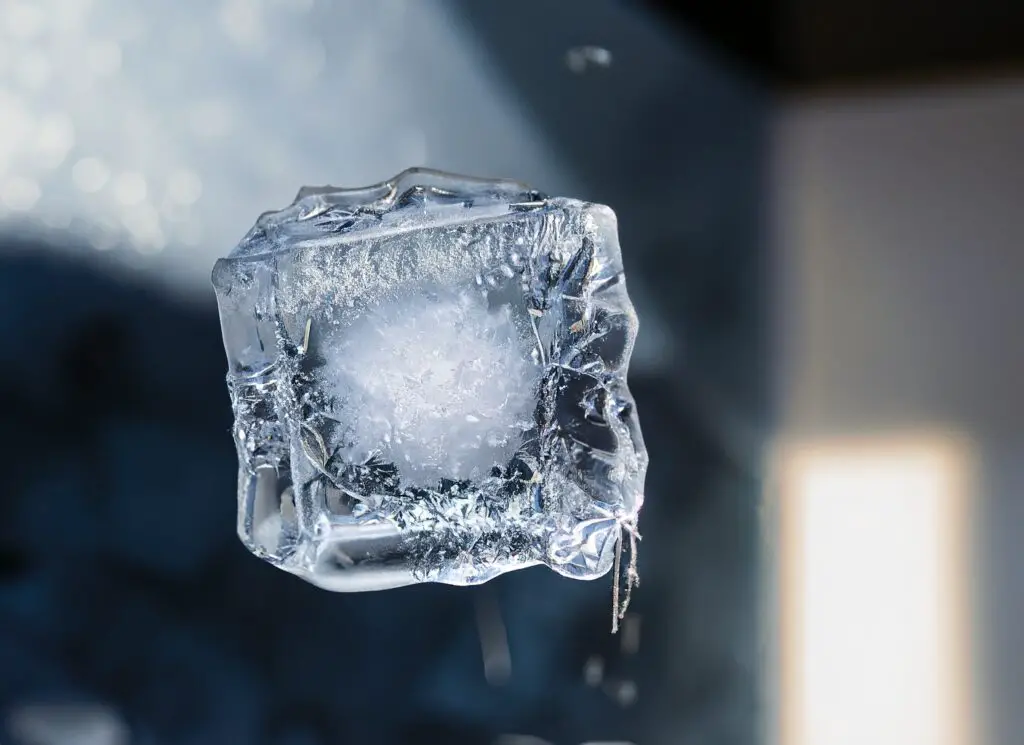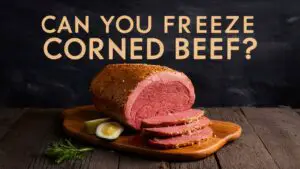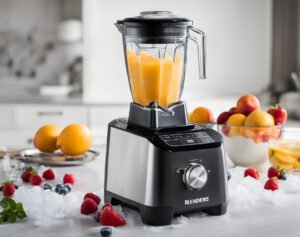Have you ever wondered, “How long does it take ice to freeze?” We’ve all been in situations where we needed ice quickly, whether it’s for a refreshing drink on a hot day or a last-minute gathering. Waiting for water to transform into solid ice can be frustrating!
So, how long does it take ice to freeze? Generally, it takes about 3-4 hours for water to freeze into ice cubes in a standard freezer.
As someone who has experimented with various freezing methods and intensely studied the science behind ice formation, I can offer valuable insights into optimizing your ice-making process. In this blog post, you’ll learn about factors affecting ice freezing duration, methods to freeze ice faster, and how to maximize your freezer’s ice production capabilities. So, let’s dive into ice freezing and start making perfect ice cubes today!
Key Facts:
- Standard ice cube freezing time is approximately 3-4 hours in a typical freezer (Source: Team Research)
- Freezing times are influenced by factors such as freezer temperature, ice cube size, and water purity (Source: Team Research)
- Mpemba Effect: hot water can freeze faster than cold water in certain conditions (Source: Team Research)
- Larger ice cubes, like 2-inch ones, usually take longer to freeze than smaller counterparts (Source: Team Research)
- Ice tray materials, such as metal or silicone, can impact ice freezing durations (Source: Team Research)
How Long Does It Take Ice to Freeze?
Under standard conditions, it takes about 3-4 hours for ice cubes to freeze in a standard freezer. However, there are a few things you can do to speed up the process, such as using hot water in your ice cube tray or placing the tray in the coldest part of your freezer.

Factors Affecting Ice Freezing Time
The time it takes for ice to freeze depends on a number of factors, including:
- The temperature of the environment. The colder the environment, the faster ice will freeze.
- The initial temperature of the water. The warmer the water, the longer it will take to freeze.
- The size and shape of the container. A larger container with a lot of surface area will freeze faster than a smaller container with less surface area.
- The presence of impurities. Impurities in the water can slow down the freezing process.
- The type of freezer. A faster freezer will freeze ice faster than a slower freezer.
Freezer Temperature and Efficiency
Optimal Freezer Temperatures: The temperature of your freezer plays a crucial role in how quickly water will freeze. In a standard home freezer with a temperature of -18°C (0°F), ice cubes will usually take about 3-4 hours to freeze. If your freezer is running at a higher temperature, the time it takes ice to freeze can significantly increase.
Upgrading Your Freezer for Faster Ice Production: Investing in modern appliances with more precise temperature controls, such as Energy Star-rated refrigerators, can help you adjust their internal conditions for optimal ice-making speed. By maintaining a proper freezing temperature, you’ll be able to create ice cubes more efficiently.
Ice Cube Size and Shape
How Large Ice Cubes Freeze: As you might expect, larger ice cubes take longer to freeze than smaller ones. So, if you want your ice cubes to freeze faster, consider using a tray that produces smaller pieces. For example, a 2-inch ice cube can take up to 6 hours to freeze, whereas smaller ice cubes might be ready in as little as 3 hours.
Choosing the Right Ice Cube Tray: The material of the ice cube tray can also affect freezing time. Metal trays, for instance, transfer heat more effectively than plastic ones, reducing ice-freezing duration. Silicone trays offer greater flexibility, making it easy to remove your ice cubes without damaging their shape.
Water Purity and Impurities
Distilled vs. Tap Water: The type of water you use can also impact freezing times. Distilled water, being free of minerals and impurities, has a more predictable freezing pattern than tap water. However, this difference may not have a significant impact on standard ice-making practices.
Removing Impurities for Faster Freezing: Adding impurities (such as salt) to the water may cause the freezing point to drop. Conversely, using filtered water will reduce the presence of impurities, resulting in faster freezing times.
Mpemba Effect: Hot Water and Ice
The Mpemba effect is a curious phenomenon where hot water can freeze faster than cold water under certain conditions. This has been observed by scientists and laypeople alike for centuries, but the exact reason for the effect is still not fully understood.
One possible explanation is that hot water evaporates more quickly than cold water. This means that the hot water has less mass to cool down, which can lead to faster freezing. Additionally, the evaporation of hot water can create small air bubbles, which can act as nucleation sites for ice crystals. This can also help to speed up the freezing process.
Another possible explanation is that hot water has a higher specific heat capacity than cold water. This means that it takes more energy to heat up hot water than it does to heat up cold water. As a result, hot water can lose more heat to the surrounding environment during the freezing process, which can lead to faster freezing.
So, why does hot water freeze faster than cold water? The exact reason is still unknown, but it is likely due to a combination of factors such as evaporation, specific heat capacity, and nucleation sites.
The Science Behind Mpemba Effect
The Mpemba Effect is a fascinating concept whereby hot water can freeze faster than cold water under specific conditions. This phenomenon occurs because hot water often loses its heat more efficiently than colder water, leading to a more rapid decrease in temperature.
Practical Applications in Everyday Ice Making
Although the Mpemba Effect is not applicable in all situations, it’s worth experimenting with hot water when making ice cubes to see if it speeds up the process. Just make sure to be careful when handling hot water to avoid accidents.
Tips for Freezing Ice Faster
Here are some tips for freezing ice faster:
- Use hot water instead of cold water. This may seem counterintuitive, but it’s true! Hot water freezes faster than cold water due to a phenomenon called the Mpemba effect.
- Use a metal ice cube tray. Metal is a better conductor of heat than plastic, so it will help the water freeze faster.
- Freeze the ice cubes in a single layer. This will help the heat escape more quickly.
- Place the ice cube tray in the coldest part of your freezer.
- If you have a lot of ice to freeze, you can try using a blast freezer. A blast freezer is a type of freezer that circulates cold air very quickly, which can help ice freeze much faster.
Optimal Freezer Organization
Organizing your freezer will also help facilitate ice production. Storing items in your freezer strategically will ensure that cold air can circulate evenly around the ice trays, promoting quicker freezing. Avoid overcrowding the freezer, as this will reduce the efficiency of your ice-making endeavors.
Specialized Ice Cube Trays and Techniques
There are several available products and techniques to aid in faster ice creation. Quick-freeze trays and materials with improved heat transfer, like metal or aluminum, can shorten the freezing process. Adopting these tools will keep your freezer stocked with ready-to-use ice.
Myths and Interesting Facts about Freezing Ice
- Myth: All ice is the same.
- Fact: There are different types of ice, each with its own properties. For example, clear ice is denser than cloudy ice, and it melts more slowly.
- Myth: Freezing water kills all bacteria.
- Fact: Bacteria can survive freezing, and some can even multiply in ice.
- Myth: Ice melt is safe for pets.
- Fact: Some ice melts contain chemicals that can be harmful to pets, so it is important to read the label carefully before using any ice melt product.
The Role of Nucleation Sites
Nucleation sites are microscopic points where ice crystals start to form. These sites can include impurities, air bubbles, or the walls of a container. A high density of nucleation sites can promote faster freezing of the water.
Fun Ice-Related Phenomena
Supercooling is a state where water remains liquid below its freezing point, due to a lack of nucleation sites. When a trigger such as agitation or an ice crystal is introduced, the supercooled water quickly freezes. This mysterious process is an exciting area of scientific research.
FAQs About How Long Does It Take Ice to Freeze
Can ice freeze in 30 minutes?
Yes, with specialized tools and techniques such as quick-freeze trays and metal molds, ice can freeze in as little as 30 minutes.
How do you freeze ice quickly?
To accelerate the freezing process, use a colder freezer, smaller ice cubes, filtered water, or trays made of materials that transfer heat more efficiently.
Can ice freeze in 2 hours?
Depending on the size, shape, and material of the ice tray, and the conditions of the freezer, it is possible for ice to freeze in 2 hours.
How fast does ice freeze at different temperatures?
The colder the temperature, the quicker the ice will generally freeze. At standard freezer temperatures (-18°C / 0°F), it typically takes 3-4 hours for regular-sized ice cubes to freeze.
Summary
In conclusion, the time it takes for ice to freeze can vary depending on factors like freezer temperature, ice cube size, and water purity. Generally, it takes around 3-4 hours for ice cubes to freeze in a standard home freezer. By understanding the science behind ice formation and applying effective techniques, you can optimize your ice-making process.





